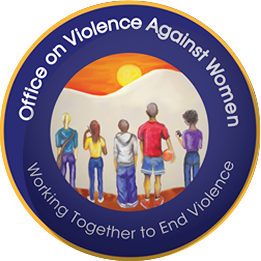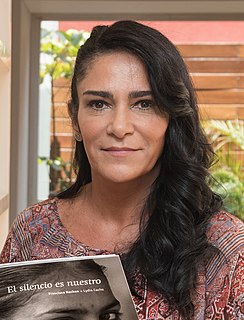
The white ribbon is an awareness ribbon sometimes used by political movements to signify or spread their beliefs. It is usually worn on garments or represented in information sources such as posters, leaflets, etc.
Women's Aid Federation of England, commonly called Women's Aid, within England is one of a group of charities across the United Kingdom. There are four main Women's Aid Federations, one for each of the countries of the United Kingdom. Its aim is to end domestic violence against women and children. The charity works at both local and national levels to ensure women's safety from domestic violence and promotes policies and practices to prevent domestic violence.

The United States Office on Violence Against Women (OVW) was created following the Violence Against Women Act (VAWA) of 1994. The Act was renewed in 2005 and again in 2013. The Violence Against Women Act legislation requires the Office on Violence Against Women to work to respond to and reduce violence against women in many different areas, including on college campuses and in people's homes. VAWA requires Office on Violence Against Women to administer justice and strengthen services for victims of domestic violence, dating violence, sexual assault, and stalking.

Lydia María Cacho Ribeiro is a Mexican journalist, feminist, and human rights activist. Described by Amnesty International as "perhaps Mexico's most famous investigative journalist and women's rights advocate", Cacho's reporting focuses on violence against and sexual abuse of women and children.

Violence against women (VAW), also known as gender-based violence and sexual and gender-based violence (SGBV), are violent acts primarily or exclusively committed against women or girls. Such violence is often considered a form of hate crime, committed against women or girls specifically because they are female, and can take many forms.

Show Racism the Red Card (SRTRC) is an anti-racism education charity, established in England in January 1996 to harness the high-profile nature of footballers as anti-racist role models to educate against racism throughout society in the United Kingdom.
Violence against women in Peru is defined as harassment or violence propagated against those who are born women. Intimate partner violence (IPV) is the most common form of gender-based violence that occurs though it can occur concurrently with sexual and emotional violence.

Domestic violence is violence or other abuse that occurs in a domestic setting, such as in a marriage or cohabitation. Domestic violence is often used as a synonym for intimate partner violence, which is committed by one of the people in an intimate relationship against the other person, and can take place in either heterosexual or same-sex relationships or between former spouses or partners. In its broadest sense, domestic violence also involves violence against children, parents, or the elderly. It can assume multiple forms, including physical, verbal, emotional, economic, religious, reproductive, or sexual abuse. It can range from subtle, coercive forms to marital rape and other violent physical abuse, such as choking, beating, female genital mutilation, and acid throwing that may result in disfigurement or death, and includes the use of technology to harass, control, monitor, stalk or hack. Domestic murder includes stoning, bride burning, honor killing, and dowry death, which sometimes involves non-cohabitating family members.
Futures Without Violence is a non-profit organization with offices in San Francisco, Washington, D.C., and Boston, United States, with the goal of ending domestic and sexual violence. Futures Without Violence is involved in community-based programs, developing educational materials, and in public policy work.
The ManKind Initiative is a domestic violence charity based in the United Kingdom and is at the forefront of providing support for male victims of domestic abuse and violence. Since becoming a charity in 2001, it has provided a helpline, training and support for statutory agencies and campaigns to ensure that equal recognition is given to male victims in the same way that recognition is given to female victims of domestic abuse. It is one of only a few charities in the country to help male victims.

Bell Bajao is an anti-domestic violence campaign that urges local residents to take a stand against physical abuse through simple acts meant to interrupt domestic violence. When residents, especially men, overhear violence against a woman taking place, they are urged to ring the doorbell and ask a simple question - such as to borrow some tea, to use the phone, or to have a glass of water. This is meant to let the abuser know that others can hear them and will act to interrupt the violence.
The following outline is provided as an overview of and topical guide to domestic violence:

Domestic violence in India includes any form of violence suffered by a person from a biological relative but typically is the violence suffered by a woman by male members of her family or relatives. According to a National Family and Health Survey in 2005, total lifetime prevalence of domestic violence was 33.5% and 8.5% for sexual violence among women aged 15–49. A 2014 study in The Lancet reports that although the reported sexual violence rate in India is among the lowest in the world, the large population of India means that the violence affects 27.5 million women over their lifetimes. However, an opinion survey among experts carried out by the Thomson Reuters Foundation ranked India as the most dangerous country in the world for women.
Domestic violence is prominent in Nigeria as in many parts of Africa. There is a deep cultural belief in Nigeria that it is socially acceptable to hit a woman to discipline a spouse. Cases of Domestic violence is on the high and shows no signs of reduction in Nigeria, regardless of the age, tribe, religion or even social status. The CLEEN Foundation reports 1 in every 3 respondents admitting to being a victim of domestic violence. The survey also found a nationwide increase in domestic violence in the past 3 years from 21% in 2011 to 30% in 2013. A CLEEN Foundation's 2012 National Crime and Safety Survey demonstrated that 31% of the national sample confessed to being victims of domestic violence.
Domestic violence in China involves violence or abuse by intimate partners or family members against one another. Intimate partner violence (IPV) by the man is the most common type of domestic violence in China; a 2005 American Journal of Public Health report found that 1 out of 4 Chinese women had experienced physical violence from their partner in the past year. Although China acknowledged that domestic violence was a problem in the 1930s, it has only become a visible issue in the past few decades due to economic and social changes in the 1980s.
Blue Teddy is a symbol created for the Break The Silence Campaign for combating child sexual abuse.
Saudi Arabia first implemented it's anti-domestic violence law in 2014 before which it was left on the judge and considered a private issue.

Amid the COVID-19 pandemic many countries have reported an increase in domestic violence and intimate partner violence. United Nations Secretary-General António Guterres, noting the "horrifying global surge", has called for a domestic violence "ceasefire". UN Women stated that COVID-19 created "conditions for abuse that are ideal for abusers because it forced people into lockdown" thus causing a "shadow pandemic" that exacerbated preexisting issues with domestic violence globally.
Jesús Tomillero Benavente is a Spanish association football referee. He was the first Spanish referee to come out as gay, and faced abuse and threats of violence that led to police protection. He founded the organisation Roja Directa to combat homophobia in sports.

The Tarjeta Transporte Público is a payment method for public transport in Madrid, the capital of Spain, and its surrounding autonomous community. Managed by the Consorcio Regional de Transportes de Madrid (CRTM), the body responsible for coordinating public transport in the Community of Madrid, as of 2019 more than 16 million TTPs are in circulation.









